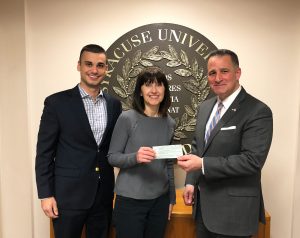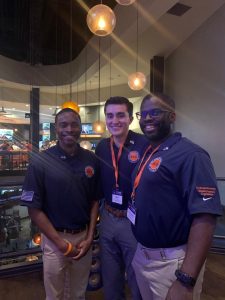 Ben Vasquez ’18 and his sister Lauren shared a passion for helping others. Ben’s leadership skills and altruism shines through each day as a police officer with the Village of Waterloo. Lauren also impacted those around her through her acts of kindness. “She had a deep impact not just on her family and friends, but with everyone who crossed her path,” says Vasquez. “I remember when she was a student at Monroe Community College, she used her limited funds to buy another student a winter coat. That’s just the type of person she was.”
Ben Vasquez ’18 and his sister Lauren shared a passion for helping others. Ben’s leadership skills and altruism shines through each day as a police officer with the Village of Waterloo. Lauren also impacted those around her through her acts of kindness. “She had a deep impact not just on her family and friends, but with everyone who crossed her path,” says Vasquez. “I remember when she was a student at Monroe Community College, she used her limited funds to buy another student a winter coat. That’s just the type of person she was.”
Vasquez, who received a bachelor’s degree in Creative Leadership from Syracuse University through University College, was recognized for his outstanding public service when he received the Chancellor’s Award for Public Engagement and Scholarship. He was the first part-time Syracuse University student to receive this prestigious honor. Since graduating from SU, he has gone on to earn a master’s degree in Homeland Security from George Washington University. Vasquez received several notable accolades throughout his academic and professional career, including his recent appointment to the Board of Ethics Committee for the City of Geneva, New York. But what drives him now is keeping his sister’s memory alive. Lauren took her own life in June 2018.
“My sister suffered from bipolar disorder and depression,” says Vasquez. “She was one semester away from completing an associate degree from Monroe Community College, and her dream was to attend Syracuse University.” To honor her memory, Vasquez and his mother Sandra wanted to help make the dream of a Syracuse University education possible for others. They established the Lauren E. Vasquez Scholarship Fund in her name. The scholarship provides financial assistance to a part-time undergraduate student who is studying in a mental health-related field. The funds are used to assist with the costs of tuition, books and other school-related expenses.
The first recipient of the award is Dinnah Dalton, who is majoring in psychology with a minor in women’s and gender studies in the College of Arts and Sciences. Dalton, 56, is grateful for the financial support that has made it possible to pursue the career she’s always dreamed of. “I’m retired, but I feel like I’m finally doing what I was born to do,” she says. “I’m a junior pursuing a bachelor’s degree in psychology. I work hard to keep up my GPA because I hope to eventually earn a Ph.D., and that will give me the edge I need to really help individuals who are dealing with difficult issues.”
Vasquez says that the scholarship fund will help students of all ages unlock their best potential in order to fulfill their dreams. “Earning a degree from Syracuse University was one of the proudest moments of my life and opened more doors for me that I ever imagined,” he says. Looking back, he credits his time at SU for his success today—and his plans for the future. He plans to apply to Syracuse University’s College of Law for the fall semester.
Vasquez said that he and his mother knew that starting this scholarship would be a lasting tribute to his sister. “By establishing this scholarship in Lauren’s name, it carries on her legacy of helping others by assisting students at Syracuse University as they earn a quality, life-changing education,” he says. “A degree is something you will cherish for the rest of your life—like we will cherish Lauren’s memory.”

 The Office of Online Student Success
The Office of Online Student Success Syracuse University Summer College
Syracuse University Summer College Ben Vasquez ’18 and his sister Lauren shared a passion for helping others. Ben’s leadership skills and altruism shines through each day as a police officer with the Village of Waterloo. Lauren also impacted those around her through her acts of kindness. “She had a deep impact not just on her family and friends, but with everyone who crossed her path,” says Vasquez. “I remember when she was a student at Monroe Community College, she used her limited funds to buy another student a winter coat. That’s just the type of person she was.”
Ben Vasquez ’18 and his sister Lauren shared a passion for helping others. Ben’s leadership skills and altruism shines through each day as a police officer with the Village of Waterloo. Lauren also impacted those around her through her acts of kindness. “She had a deep impact not just on her family and friends, but with everyone who crossed her path,” says Vasquez. “I remember when she was a student at Monroe Community College, she used her limited funds to buy another student a winter coat. That’s just the type of person she was.” The world of online learning continues to grow at a rapid pace as busy adults who want to earn a degree or certificate recognize the importance of flexibility and convenience while juggling responsibilities such as work, family and military service.
The world of online learning continues to grow at a rapid pace as busy adults who want to earn a degree or certificate recognize the importance of flexibility and convenience while juggling responsibilities such as work, family and military service.